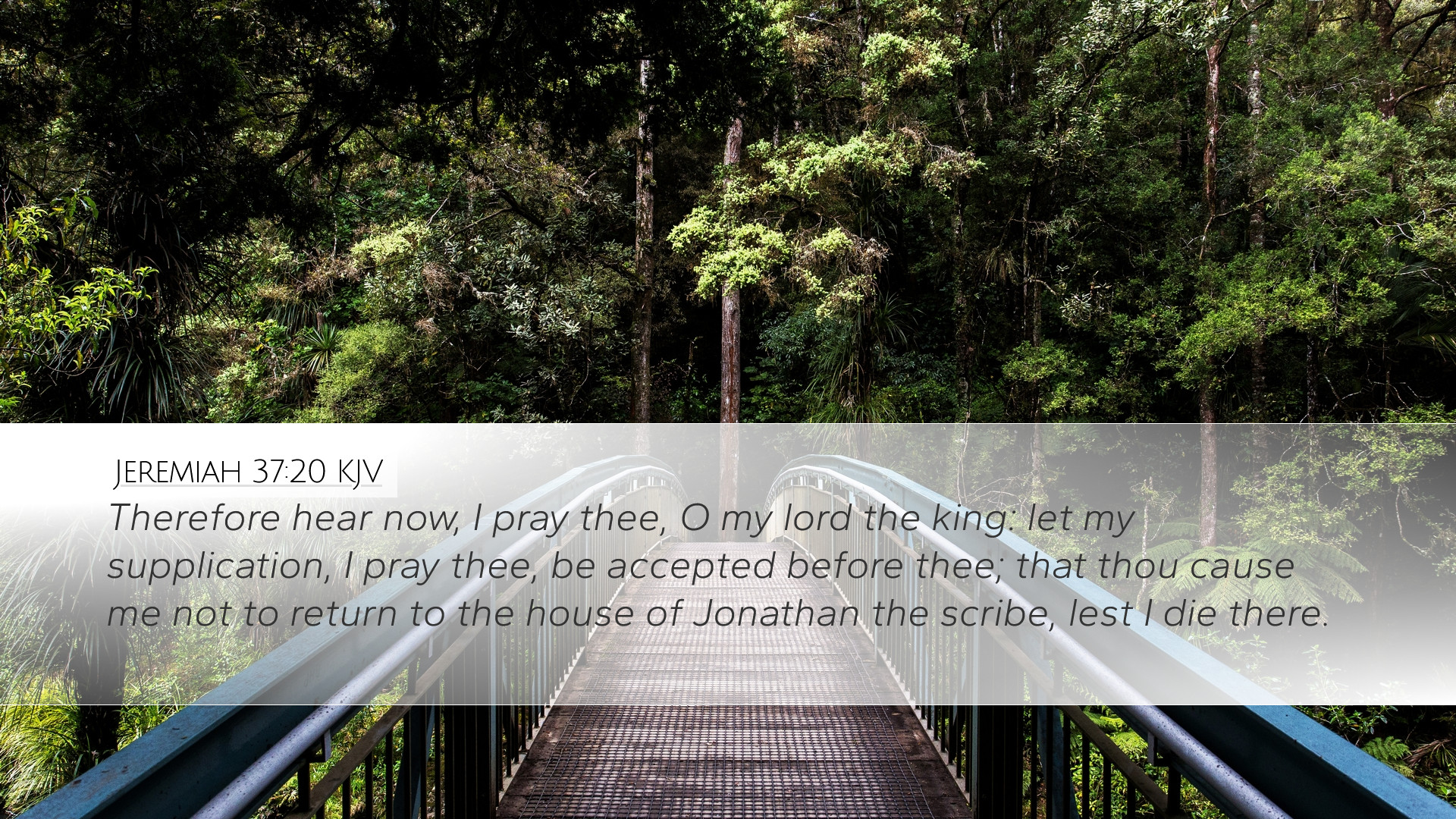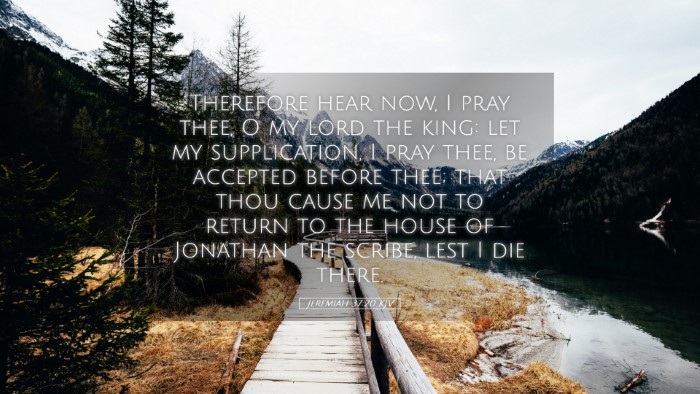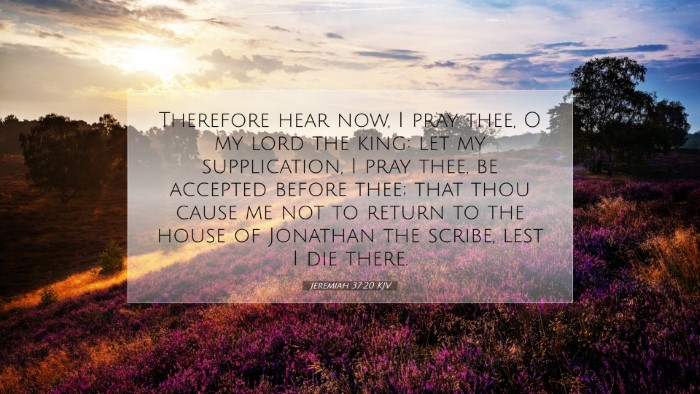Bible Commentary on Jeremiah 37:20
Verse (Jeremiah 37:20): "Therefore hear now, I pray thee, O my lord the king: let my supplication, I pray thee, be accepted before thee; that thou cause me not to return to the house of Jonathan the scribe, lest I die there."
Contextual Overview
The book of Jeremiah is fundamentally a record of the prophet's experiences and messages during the final days of Jerusalem before its conquest by Babylon. In this specific verse, we find Jeremiah appealing to King Zedekiah during a tumultuous period of political strife and prophetic condemnation. The backdrop of this plea raises various theological and historical considerations that reflect the turmoil of the times.
Commentary Insights
Matthew Henry's Insights
Matthew Henry emphasizes Jeremiah's position as a prophet caught between divine instruction and human authority. In his commentary, Henry highlights the tension between Jeremiah's prophetic calling and the dangerous circumstances surrounding his imprisonment. He notes:
- Desperation in Appeals: Jeremiah's request reveals the desperation of his situation; he fears for his life if he returns to his former confinement. This shows not only the peril of a prophet’s role during such a critical time but also the urgency in his plea.
- The Role of Kings: Henry reflects on the responsibilities of rulers and their response to prophetic voices. King Zedekiah's actions or inactions are pivotal to the fate of Jeremiah, emphasizing the intertwining of earthly governance and heavenly mandates.
Albert Barnes' Commentary
Albert Barnes offers a detailed exegesis of this passage, focusing on the historical and spiritual implications of Jeremiah's plea. Barnes notes:
- Lack of Understanding: Zedekiah’s failure to understand the prophetic message demonstrates a broader ignorance of God’s plans for Jerusalem. Barnes suggests that this illustrates the tragic disconnect between the spiritual authority of prophecy and the political realities of leadership.
- Symbolic Representation: Barnes interprets the house of Jonathan the scribe as a symbol of confinement and despair. By expressing his fear of returning there, Jeremiah symbolizes the despair of a nation that has strayed from divine instruction.
Adam Clarke's Interpretation
Adam Clarke provides additional context by shedding light on the cultural and hermeneutical dimensions of the verse. His reflections include:
- Importance of Supplication: Clarke underscores the concept of supplication within the framework of Jewish tradition. Jeremiah’s humble request is indicative of the respect due to a king, yet also highlights the desperate circumstances that compel such a request.
- Fear of Death: Clarke discusses the gravity of Jeremiah's fear of death, linking it to the prophetic tradition where prophets often faced persecution. This aligns with the broader biblical theme of the cost associated with speaking truth to power.
Theological Implications
Analyzing this passage through the collective insights of these commentators offers several theological implications for modern readers:
- The Nature of Prophecy: The peril faced by Jeremiah illuminates the nature of prophetic authority and the inevitable tensions faced when divine truth conflicts with human power.
- Clarity in Communication: As leaders and followers of the faith today, there is a significant lesson on the importance of clear communication and the willingness to hear the prophetic voice, particularly when it does not align with popular opinion.
- Faith in Crisis: Jeremiah’s situation can serve as a model for how to maintain faith in times of distress; his supplication reflects a reliance on divine delivery amid perilous circumstances.
Practical Applications
For pastors, theologians, and students of the Bible, Jeremiah 37:20 encourages a deep reflection on a few cornerstone tenets:
- Empathy in Leadership: It reminds leaders to empathize with those who may voice dissent or warnings. Recognizing the spiritual weight of such appeals can foster a culture of listening and understanding.
- Sensitivity to the Spirit: Engaging deeply with the Holy Spirit for guidance is paramount, especially in leadership roles where decisions can have grave implications.
- The Role of the Church: This verse serves as a reminder for the contemporary church to advocate for the voiceless and uphold truth, even when it is inconvenient or dangerous to do so.
Conclusion
In sum, Jeremiah 37:20 encapsulates the profound struggles of a prophet caught within the nexus of divine mandate and human authority. The commentaries from Matthew Henry, Albert Barnes, and Adam Clarke provide rich insights into the historical, theological, and practical dimensions of this text, reminding believers of the significance of faithfulness amidst adversity. This passage stands as a timeless call to action for clarity, discernment, and courage in the face of daunting realities.


